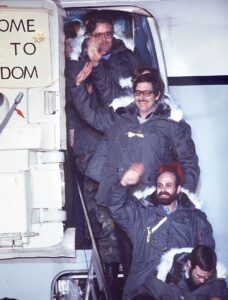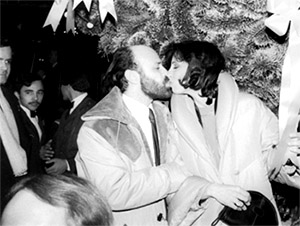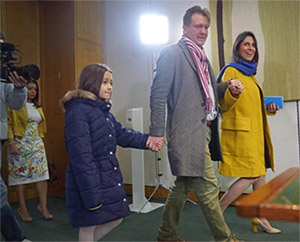Barry Rosen (Iran), who was held hostage by Iranian militants 1979–81, went on hunger strike in January
As a hostage held for 444 days in Iran I know Nazanin Zaghari-Ratcliffe’s joyful family reunion is complex

Former hostage Barry Rosen, 77, on hunger strike in January 2022, four decades after his own ordeal to protest against innocent people being detained. (Photo by JOE KLAMAR/AFP
Barry Rosen (Iran 1967-69) was held in appallingly brutal conditions by Iranian militants, subjected to mock executions. He tells Kasia Delgado about the reality of returning to his wife and children, and why he feels such anger at Boris Johnson.
By Kasia Delgado, inews.com
March 31, 2022
•
The joyful photographs of Nazanin Zaghari-Ratcliffe being reunited with her husband, Richard, and daughter, Gabriella, showed a family back together, her horrendous six years being held hostage in Iran finally over. Yet those gleeful images of a homecoming are not the end of the story. For hostages, resuming ordinary life after the homecoming can be an immense challenge.
Learning how to live with his hostage experience has been a long, difficult process for Barry Rosen, who was one of 66 Americans seized inside the US embassy in Tehran on 4 November 1979.

The moment the hostages returned home. Barry Rosen is second from the bottom waving with no glasses and a beard (Photo by Tim Chapman/Getty/ Hulton Archive)
He was held in appallingly brutal conditions for 444 days by Iranian militants, threatened with automatic weapons pointed at his head, subjected to mock executions, held blindfolded for days on end, hands and feet tied together, with long stretches of total isolation and never knowing if he would live or die.
“Captivity changes your entire life,” the 77-year-old Rosen tells i over Zoom in a quiet, gentle tone from his home in New York. “And I don’t believe I live without it most of the time. When I got home, and since then, I’ve had to face my own images and memories of that time, which kept popping up and have been with me at moments ever since.”
Rosen, born in Brooklyn, had been the US embassy’s new press attaché in Iran. He had spent two years in the country as a Peace Corps volunteer in the ’60s, was fluent in Farsi and had – and still has – a deep love of the country, its culture and its people. But then the Iranian revolution came, which led to the Iran hostage crisis and landed him in hell. He was released on 20 January 1981.
“It was wonderful getting out of captivity, and I felt very free at that moment,” he says. “But the time that you spend in captivity is your time and nobody really truly knows what it’s been like other than you, and even you don’t know what the impact will be. You’re so caught up in all those days and hours with your lonely self, that when you’re sent home, it’s hard.”
When Rosen was taken hostage in his early thirties, he was separated from his wife, Barbara, a two-month-old daughter and a three-year-old son.
“When I got home, I was trying very hard to reconnect with them, or to connect with them. My son was older and more aware of what was going on, and Barbara has told me he did come out with some remarks when I was gone about how his daddy was going to be shot dead. My daughter didn’t know who I was, and those were very difficult times. It was a slow, slow process. I would say that going home isn’t exactly going home.”
He suggests, his mind turning to Zaghari-Ratcliffe‘s ordeal, that because her daughter, Gabriella, is much older at seven, she will be “very aware of all this”, and the family will be likely working on this recovery together, all three of them. Children were one thing, but his marriage was another.
“My relationship with Barbara was harder in many ways because she was very valiant and worked very hard while I was away to keep everything going,” says Rosen.

Barry Rosen and his wife, Barbara soon after his release. ‘I’ve got a strong family’ (Photo: Bettmann/Getty)
“Then suddenly it’s over, I’m back, what do we do now? I don’t think we handled it as well as I would have handled it today, and believe it not, I don’t think we thought about having therapy together.”
“We were just supposed to be very happy and that was a slower, and harder process. We’re together, we’ve worked together on this over the years. The recovery process is not a finished product, we’re always dealing with it all the time.”
Rosen returned home with profound questions about how to be a father and husband, but also about how to get through an average week. “You’re working, and doing your normal life, taking care of the family, but those feelings come back. Some would call it PTSD, I don’t know what I call it, but you’re the only one who feels it really, and you try to tell therapists and other people, but it’s unusual.
“You can go on OK for many months,” says Rosen. “Then suddenly what happened takes hold of you and you have to work so hard in order to deal with these issues.”
For all Rosen has been through, he sees himself as fairly optimistic about life after the horror of being a hostage. “I would say that most of us are pretty good and healthy, and I’ve got a strong family.”
The effects linger, even in younger family members. “Even my grandchildren are affected by it, because they just don’t understand how this could have happened to their grandfather, but I think it’s important for them to understand about this and about any other human going through this. But for us who are in it, for me, it’s lifelong, and I think for Barbara it is pretty much lifelong, too. We’ve learnt a lot about each other and Barbara’s been very patient with me over the years.
“Being a hostage had a tremendous impact, but many of us can also make it out of this and make something good out of it. I think I’ve made something good out of it by helping others.”
Rosen has since his release been committed to helping bring about educational reform in Afghanistan, and has been an advocate for the needs of hostages and their families.
In January this year he went on a hunger strike to push for the release of those unlawfully jailed in Tehran. What Rosen hopes for Nazanin Zaghari-Ratcliffe and other hostages who are released is that they are treated with support and patience by those around them and by the public. There is a great deal of pressure to look constantly happy and grateful, but it’s more complicated than that.

Nazanin Zaghari-Ratcliffe, husband Richard and their daughter Gabriella are back together again, in need of privacy (Photo: Victoria Jones/Getty)*
“The nature of these news events is that people only see the exterior, the photos, the smiles. Nobody can understand what it’s like to be held hostage for six years or 444 days or any other amount of time: they’re just numbers to [other] people, but they’re not numbers for us,” he says.
“Those are minutes, moments, days stolen from us. I think it’s important to leave Nazanin alone, let them figure this all out. I think she and her family are supposed to live happily ever after, but I’d imagine she and Richard will go through many moments where they have to cope with what has happened.”
Rosen is softly spoken but he says he is angrier than ever about what is happening to humans caught up in geopolitical conflict and what he perceives to be governmental failings.
“This keeps going on and on, no government works together with any other government to stop this from happening. With hostages the government was more worried about trade relations with Iran than the humans.
“Not only are hostages taken willfully but look at all the men and women in jail in Iran, the human rights violations are amazingly high, and yet we put that aside. Iran will take hostages over and over again, and humanity is discarded for pragmatic issues.

Barry Rosen: ‘Being a hostage had a tremendous impact, but many of us can also make it out of this’ (Photo:Tommy Gilligan)
Barry Rosen: ‘Being a hostage had a tremendous impact, but many of us can also make it out of this’
“I am very angry at our own US government and I don’t know how Nazanin feels but I’d be 10 times more angry at the UK Government and at Boris Johnson, who is in my opinion a moron, so insensitive, so unable to get the right information out, causing her to stay longer than she should have.
“It shouldn’t have taken six years for Nazanin* to be let out and I think that any anger she has is justified.” It used to be more difficult for Rosen to talk about the impact of being a hostage, so he dealt only in the political side of things, arguing for how Iran – a country he loves which is being ruined by a terrible regime – should be punished or sanctioned. As he’s got older, he has healed enough to talk more about “how we live as people after the suffering”.
Soon he will celebrate his 50th wedding anniversary with Barbara. “She’s been my partner for all that time through thick and thin.” He adds with a smile, “sometimes very thin…
“For me, the impact of this which was so negative has in time become more positive. The impact of being a hostage will be with me for ever and I wouldn’t say I’m better for it, but I certainly understand more what life is all about.”
______
* LONDON, UNITED KINGDOM – MARCH 21: Nazanin Zaghari-Ratcliffe, Richard Ratcliffe and their daughter Gabriella arrive for a press conference hosted by their local MP Tulip Siddiq in the Macmillan Room, Portcullis House, following her release from detention in Iran last week, on March 21, 2022 in London, England. Zaghari-Ratcliffe, a British-Iranian national, was detained by the Iranian authorities whilst visiting her parents in Tehran with her baby daughter Gabriella and held captive for nearly six years. She was freed last week after the UK government settled a longstanding debt over a cancelled defence contract with Tehran. Mrs. Zaghari-Ratcliffe’s husband Richard campaigned tirelessly for her release keeping her plight firmly in the public eye.
No comments yet.
Add your comment